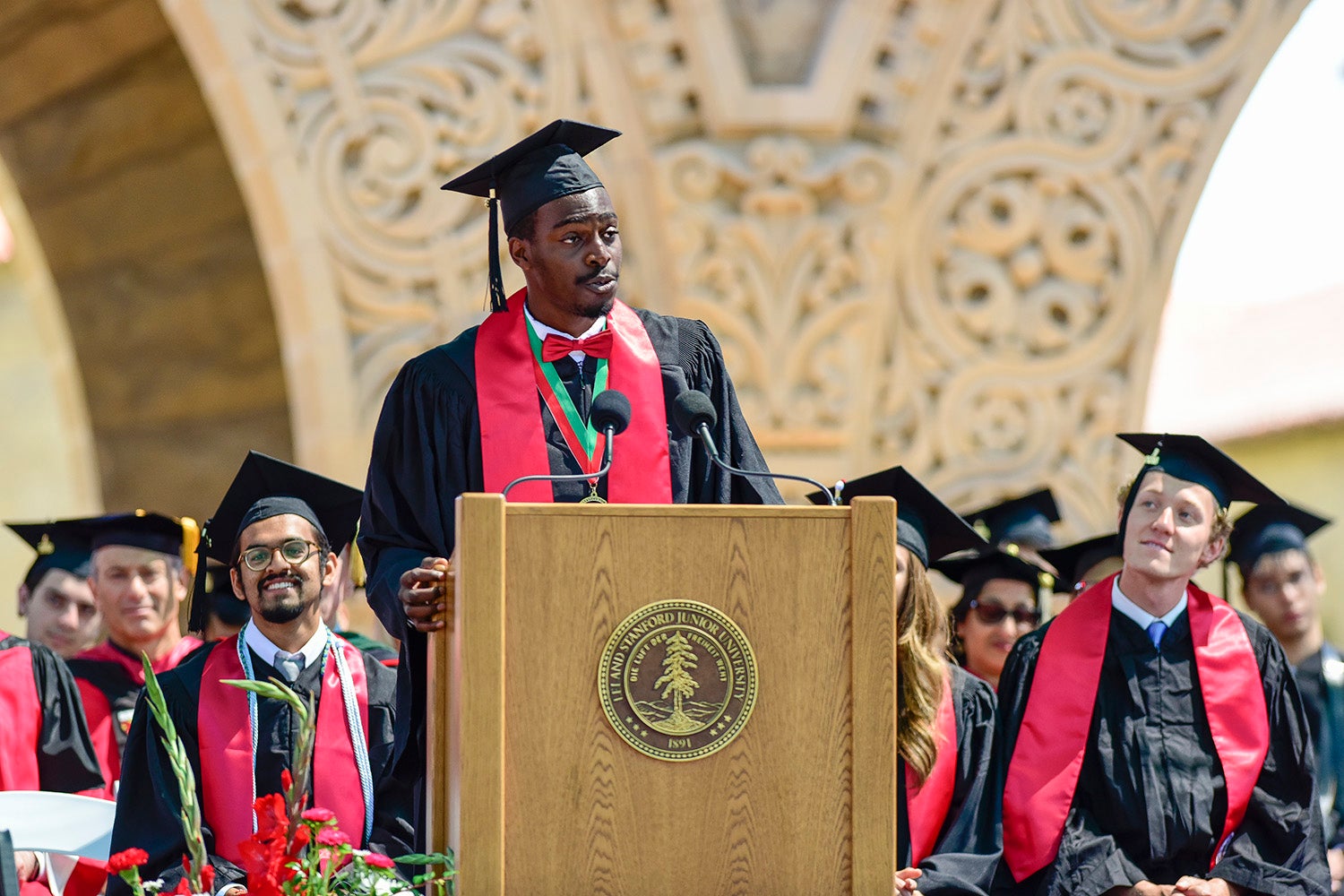In a world filled with beauty and possibility but also violence and injustice, poet and scholar Elizabeth Alexander calls for actions that are fair, just and kind.
Go to the web site to view the video.
Alexander delivered the call for action as part of her keynote address at Stanford’s Baccalaureate ceremony, a multifaith celebration for graduating students and their families and friends. Organized through the Office for Religious Life, Baccalaureate is a student-led commemoration acknowledging the spiritual rewards of education.
Wishing for justice is not enough, Alexander said. “It is not enough to hope that people will do right. If we value it, we must stand for it, and fight for it. Now that will look many different ways, but what if all of us here described ourselves as ‘justice warriors?’”
She asked graduates to consider how contributions to society might be judged. She suggested: “What if we consciously measured our actions large and small by the questions, Is this generous? Is this fair? Is this just? Is this kind?”
Live and lead with love
Alexander, a renowned storyteller nominated twice for a Pulitzer Prize, shared several personal stories, including the journey of her late husband, Ficre Ghebreyesus, who fled from war-torn Eritrea. He found his home in the United States after making his way through Sudan by foot, then Italy and Germany until he reached New Haven, Connecticut.
“Take care with your words for it is with your words that you offer each other your souls.”
—Elizabeth Alexander
His story reminded Alexander of just how precious and precarious life is, and to value it.
Referring to her husband as “my refugee,” she said: “My refugee’s presence in my life reminds me of the limits and dangers of nationalisms everywhere, that lives and families can be torn apart and that in the words of W. H. Auden we must love one another or die.”
Alexander went on to ask for compassion. “In the story of my refugee is we are impoverished if we remain strangers to each other. Dehumanizing others can result in the near-annihilation of people.”
Alexander’s advice
Alexander closed her address with some advice to graduates.
Keep regular, meaningful contact with across generations, Alexander said. She urged graduates to always share what one has, to learn another language and to walk daily. She also said when saying goodbye, look the person in the eye and “wait until they are out of your sight before you turn from them.”
Alexander also stressed caution with language.
“Take care with your words for it is with your words that you offer each other your souls,” she said.
Alexander’s final advice? “Lead with love.”
Alexander is president of the Mellon Foundation, a philanthropic organization for higher education and the arts. She has written on topics such as race, gender, politics and motherhood. She has published six poetry books, two collections of essays and a play. In 2009, she composed and delivered “Praise Song for the Day” for the inauguration of President Barack Obama.
Turning obstacles into learning opportunities
Taking the stage after Alexander was senior Eni Jonathan Asebiomo, who was selected from among 46 competitive and compelling submissions to deliver the Baccalaureate student reflection.

Eni Asebiomo, graduating senior in computer science, offered the student reflection at the Baccalaureate celebration. (Image credit: L.A. Cicero)
While Commencement is a time when many graduates look toward their future, for Asebiomo it is also an opportunity to reflect and show gratitude.
“Take a minute. Think of everyone who taught you anything at all in the last four years – whether that was advanced coursework, or what it feels like to be truly cared for – and thank them,” said Asebiomo.
During his time at Stanford, Asebiomo was involved in Frosh Council, the Undergraduate Senate, the Leland Stanford Junior University Marching Band and the Robotics Club. He was also a Resident Assistant on campus for two years.
While a student, Asebiomo said that there were moments when he struggled to recognize his strengths.
“I learned what it feels like to truly doubt my own ability, and feel like the only person in the classroom who doesn’t understand what is going on,” Asebiomo said. “But because of that, I learned how to seek help when I need it – I learned that I’m never the only one struggling and that I really do have the skills and capability to do what I set my mind to.”
Asebiomo said that through these experiences, he found ways to help others. He said: “I learned how to have difficult conversations often at the most unexpected of times – both as an RA and as a friend – and I learned just how important these conversations can be.”
Asebiomo, who is from Brooklyn, New York, will receive his bachelor’s degree in computer science at Sunday’s Commencement.
In closing, Asebiomo said: “Thank you, Class of 2018, for being some of the best teachers I could ask for. You taught me how to live life, how to love life, and what it means to be a Stanford Cardinal. Remember – even though we may not be students for too much longer, this is just the beginning of our education.”